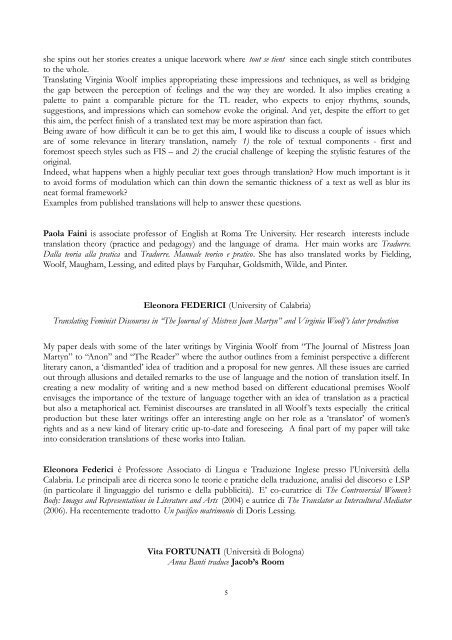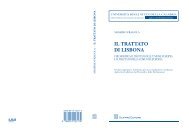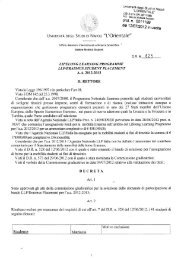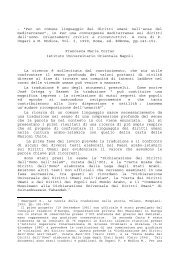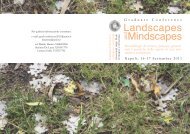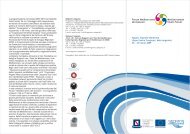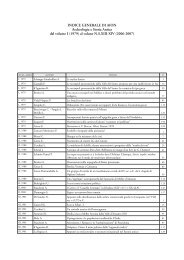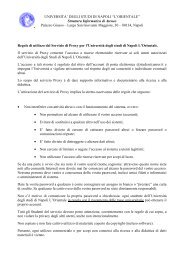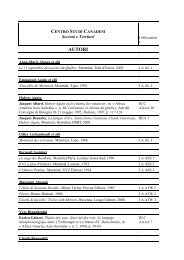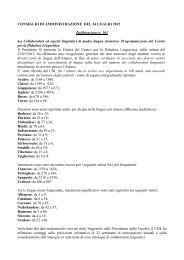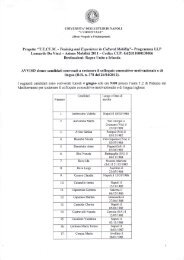Alessia Oppizzi - Università degli studi di Napoli L'Orientale
Alessia Oppizzi - Università degli studi di Napoli L'Orientale
Alessia Oppizzi - Università degli studi di Napoli L'Orientale
Create successful ePaper yourself
Turn your PDF publications into a flip-book with our unique Google optimized e-Paper software.
she spins out her stories creates a unique lacework where tout se tient since each single stitch contributes<br />
to the whole.<br />
Translating Virginia Woolf implies appropriating these impressions and techniques, as well as bridging<br />
the gap between the perception of feelings and the way they are worded. It also implies creating a<br />
palette to paint a comparable picture for the TL reader, who expects to enjoy rhythms, sounds,<br />
suggestions, and impressions which can somehow evoke the original. And yet, despite the effort to get<br />
this aim, the perfect finish of a translated text may be more aspiration than fact.<br />
Being aware of how <strong>di</strong>fficult it can be to get this aim, I would like to <strong>di</strong>scuss a couple of issues which<br />
are of some relevance in literary translation, namely 1) the role of textual components - first and<br />
foremost speech styles such as FIS – and 2) the crucial challenge of keeping the stylistic features of the<br />
original.<br />
Indeed, what happens when a highly peculiar text goes through translation? How much important is it<br />
to avoid forms of modulation which can thin down the semantic thickness of a text as well as blur its<br />
neat formal framework?<br />
Examples from published translations will help to answer these questions.<br />
Paola Faini is associate professor of English at Roma Tre University. Her research interests include<br />
translation theory (practice and pedagogy) and the language of drama. Her main works are Tradurre.<br />
Dalla teoria alla pratica and Tradurre. Manuale teorico e pratico. She has also translated works by Fiel<strong>di</strong>ng,<br />
Woolf, Maugham, Lessing, and e<strong>di</strong>ted plays by Farquhar, Goldsmith, Wilde, and Pinter.<br />
Eleonora FEDERICI (University of Calabria)<br />
Translating Feminist Discourses in “The Journal of Mistress Joan Martyn” and Virginia Woolf’s later production<br />
My paper deals with some of the later writings by Virginia Woolf from “The Journal of Mistress Joan<br />
Martyn” to “Anon” and “The Reader” where the author outlines from a feminist perspective a <strong>di</strong>fferent<br />
literary canon, a ‘<strong>di</strong>smantled’ idea of tra<strong>di</strong>tion and a proposal for new genres. All these issues are carried<br />
out through allusions and detailed remarks to the use of language and the notion of translation itself. In<br />
creating a new modality of writing and a new method based on <strong>di</strong>fferent educational premises Woolf<br />
envisages the importance of the texture of language together with an idea of translation as a practical<br />
but also a metaphorical act. Feminist <strong>di</strong>scourses are translated in all Woolf ’s texts especially the critical<br />
production but these later writings offer an interesting angle on her role as a ‘translator’ of women’s<br />
rights and as a new kind of literary critic up-to-date and foreseeing. A final part of my paper will take<br />
into consideration translations of these works into Italian.<br />
Eleonora Federici è Professore Associato <strong>di</strong> Lingua e Traduzione Inglese presso l’Università della<br />
Calabria. Le principali aree <strong>di</strong> ricerca sono le teorie e pratiche della traduzione, analisi del <strong>di</strong>scorso e LSP<br />
(in particolare il linguaggio del turismo e della pubblicità). E’ co-curatrice <strong>di</strong> The Controversial Women’s<br />
Body: Images and Representations in Literature and Arts (2004) e autrice <strong>di</strong> The Translator as Intercultural Me<strong>di</strong>ator<br />
(2006). Ha recentemente tradotto Un pacifico matrimonio <strong>di</strong> Doris Lessing.<br />
Vita FORTUNATI (Università <strong>di</strong> Bologna)<br />
Anna Banti traduce Jacob’s Room<br />
5


